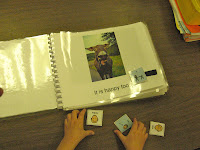Pages
The Southern California Augmentative and Alternative Communication Network...
...is a support group for professional development, problem solving, leadership, mentoring, and training in the use of augmentative and alternative communication (AAC) to develop communication in non-speaking and minimally verbal individuals in the Southern California Region.
Follow this blog via email at the right.
Follow this blog via email at the right.
Join our email list: socalaacnetwork@gmail.com
Friend us on Facebook SoCal AAC
Friend us on Facebook SoCal AAC
Follow us on Twitter @SCAACN
Wednesday, March 28, 2012
Autism-Community.com
Tuesday, March 27, 2012
How Do Children with Autism Develop Speech? (Hodgdon)
From Linda Hodgdon
Thursday, February 23rd, 2012 at 1:30 pm
Many young children with autism are non-verbal or delayed in developing speech. Speech Therapy or some type of early intervention program is recommended when those children are identified.
By the time a typically developing child is two, it is generally expected that they will be using some words to communicate. The vocabulary of the typically developing toddler might contain somewhere between 75-225 words. When young children do not develop those early words, that is a signal for further investigation.
A recent article highlighted Researchers at Bryn Mawr College’s Child Study Institute who have identified a list of 25 words that they suggest every (typically developing) child should be using by age two.
Here is their list of 25 common words that they say should form the building blocks of a (typically developing) toddler’s vocabulary:
-all gone -baby -ball -banana -bath -bye bye -book -car -cat -cookie -daddy -dog -eye -hat -hello/hi -hot -juice -milk -mommy -more -no -nose -shoe -thank you -yes
It’s an interesting list. . .typical food items, body parts, clothing. The targeted words are those that are most commonly integrated into early interactions with young children during the course of daily activities. Of course, the most important words on that list that young children speak are “no,” “yes,” “more” and “all gone.”
After looking at this list I have an important question. What vocabulary is being targeted in early Speech Therapy or in the early intervention setting for children with autism? How does that coordinate with this list of early words?
How do therapists, teachers and parents select the vocabulary to focus on when they teach speech to children with autism?
Please comment on your most important vocabulary (on Linda's blog - HERE!!!)
Great Ideas! No Time For Flashcards blog
A hot tip via Chapel Hill Snippets:
No Time For Flashcards heralds itself as a site for hands-on, exploration and craft activities geared to learners in the toddler to preschool range. We tend to work with learners that are often excited by activities that also relate to this young age group. I love it!
Take a look at their panoply of links to Spring-themed crafts, HERE
(the first 12 of 100+ are included below)
Monday, March 26, 2012
New Fav Blog - Chapel Hill Snippets
Chapel Hill Snippets (LINK) is Ruth Morgan,SLP,'s resource hub for sharing activities and materials for building picture-supported communication skills as well as Technology Tutorials (links list below). Many thanks to Holly Schneider, SLP, for this great blog tip!
I like this seasonal selection she links to (from Tarheel Reader) EASTER EGGS BOOK (by Leanna Ritchie) and her ICONS TO GO WITH IT. (HERE is my own comm board, a few more choices) in addition to the Egg Coloring book (below).
Thank you Ruth!
SHARING MATERIALS from Chapel Hill Snippets
Number Puffs Powerpoint Recipe
Ocean Book Packet
Easter Egg coloring direction booklet
Cats and Verbs---free book and directions for a puppet
Dogs and Verbs book to download
Counting Horses + Verbs book to download
What Can Horses Do? Smartboard lesson to download
Three items from our winter unit to download
Friendship Hearts---yummy simple recipe booklet
Snowman, Snowman--Smartboard lesson
The Very Hungry Reindeer--Printable and Smartboard
Roll the die; Build a Snowman Smartboard Game
Christmas Tree Smartboard Activity
Valentine Toast--Recipe Book and communication board
Valentine Feelings book
Counting buttons---low tech and high tech
Hearts Everywhere---printable book to download
Love Bug (Smartboard--high tech download, plus link to low tech)
Quick as a Cricket visuals
Self Regulation Scale
Pronouns, people, animals, feelings
printable book and icons
Pronouns book to print--He, She, They
A streamer rainbow--printable directions and communication board
Links to TECH TUTORIALS from Chapel Hill Snippets (scroll over and click)
Putting forms on your home screen for recording data
Screen Capture of Boardmaker icons to Proloquo2Go (iPad 1)PC--Boardmaker to Proloquo2Go Tutorial
Saving images from the internet into your iPad
Downloading YouTube videos to edit
Subscribe to:
Posts (Atom)






























